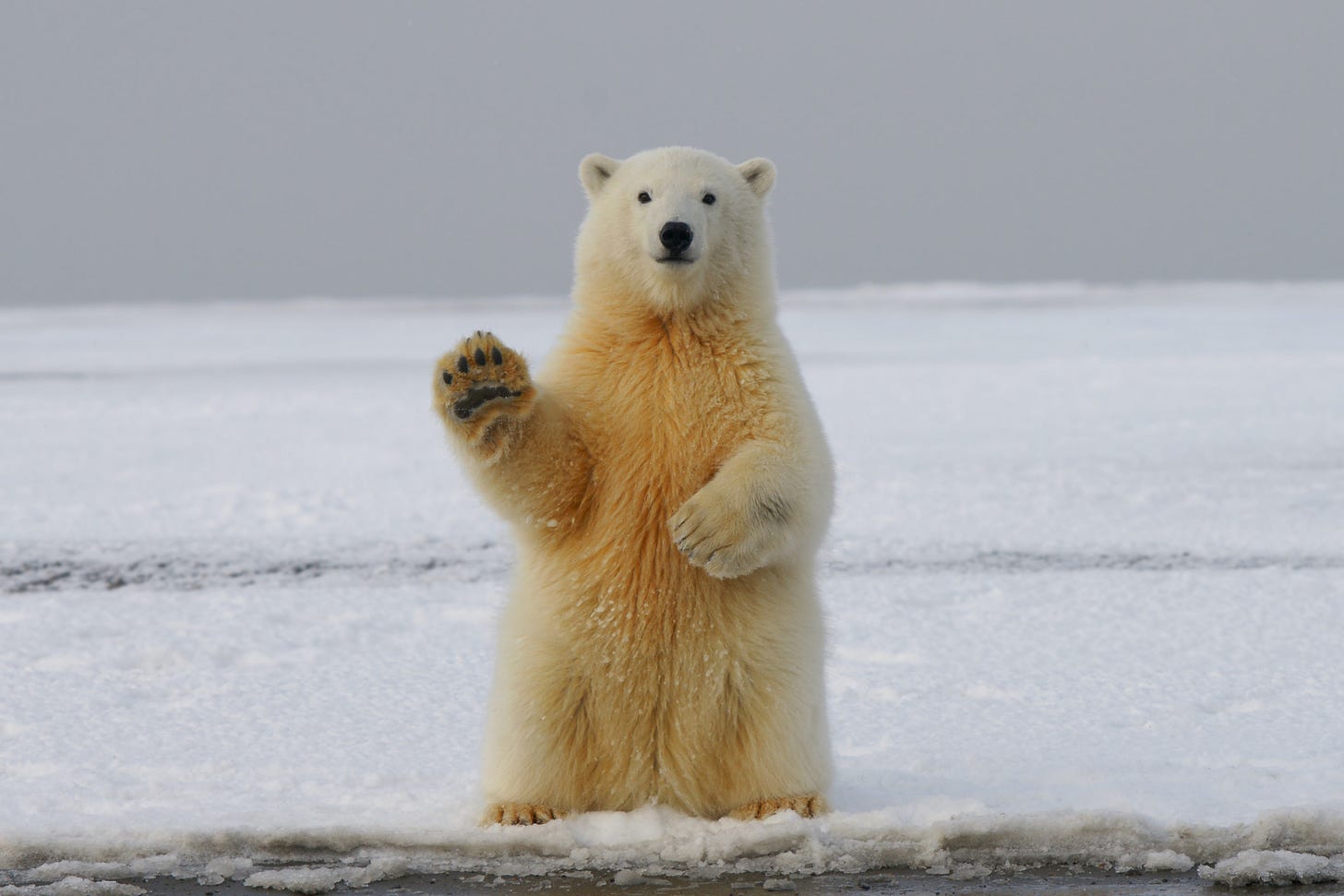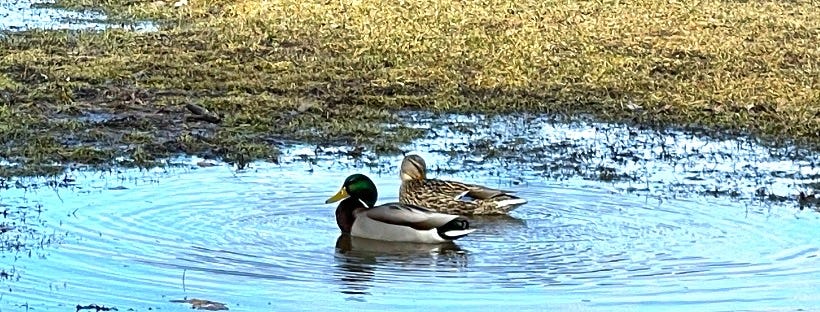We have created a hot planet with egg-eating hungry polar bears and increasingly empty oceans around the equator
Reports published on the impact of climate change on wildlife.
The climate crisis is the perfect storm, and it is made worse by the slow onset of the changes. These may be dramatically quick on a geological scale, but we overlook many small changes in a human lifetime.
It gets worse if you narrow the 80-year-life timeframe to the often short career of politicians. When they have arrived in a responsible position as a minister, they unknowingly set the situation on day one of their new job as their baseline. They tend to measure any progress made during the handful of years in office against the starting situation. They don't notice it if, in those few years, the insect population declines by five percent. Nor will their successor during the next few years in office, so another five percent is lost.
It is the week of Thanksgiving, and this is your chance to become a supporter of this newsletter (or give it to a friend or family member). Only until the evening of Black Friday can you make use of a 20 percent discount for 12 months; it brings the cost of a subscription down to only 13 cents per day.
Measures to save the environment are hardly ever popular in the short term but often quite successful in the long term, which frightens politicians since their successor could claim the success of your policies.
Climate change impact is often far away
So politicians, and most bureaucrats working for them, are slow to react to a slowly developing existential crisis. It gets even worse when the crisis impacts are felt far away, even if the cause for the change is in your own country. And if climate change impacts animals instead of humans in countries far away, you have the perfect file for any minister to ignore as long as possible.
Having worked in bureaucracies before I started to work independently, I recognize the patterns of why we collectively, as a destructive species, react too slow at an existential crisis like climate change and the loss of nature. I mentioned just a few elements, but I want to move on and write about Week 14 of this year's countdown in the last 52 days.
I was searching the internet for the news stories of that week; not a day passed without articles about the murder of George Floyd. I could now easily bridge that tragic story to today's guilty verdict for the murderers of Ahmaud Arbery. Or write about Kyle Rittenhouse, whom I just saw on Twitter, hosted by Trump, not unlike the pictures you see of presidents receiving Olympic medal winners after their triumphant return from the games. (full disclosure: he is not the president, and no, there are no winners on that photo).
But I won't. Others will get those clicks. So instead, I want to tell you about a few news stories that I found in the newspapers in the week of five to eleven April this year. These are all the kinds of reports, ignored by politicians, about the slowly increasing impact of climate change on animals that can't vote for them, and they live in countries or areas of the planet far from their capitals.
The Arctic
One of those regions is the Arctic, where the polar bears struggle to adapt to their rapidly changing environment and where their hunting grounds on sea-ice shrink because of climate change. As a result, polar bears are increasingly foraging on seabird eggs across parts of their range. But polar bears have evolved to hunt seals on the ice, and they turn out to be relatively inefficient predators of seabird eggs. These are some of the findings in a study published in the journal Royal Society Open Science, based on field research on Mitivik Island, Nunavut, Canada.
There are approximately 25,000 polar bears left in the wild today, living across the Arctic in Alaska, Canada, Greenland, Norway, and Russia. Polar bears are so specialized in their diets that they may struggle to adapt to the warming Arctic. Nature Climate Change published a study last year, estimating that these environmental changes in the species' habitat would starve them to extinction by 2100.
Several polar bears encountered grizzly bears in the past few years, and these unlikely romances have produced offspring. Survival strategies may be clumsy by proved inefficiency in hunting for eggs but seem to have become more creative on the southern fringe of their range.
High extinction percentages at 3C warming
Those polar bears are not alone. In the same week that researchers published their egg hunting techniques, other scientists published another study in Biological Conservation. After analyzing 270 biodiversity hotspots, they concluded that half of the endemic marine species and 84% of endemic mountain species would face extinction if the planet warms by more than 3C.
It was one of the many pleas of scientists to our leaders to take climate change seriously, especially in the year leading up to the all-important COP26. Unique island species, including lemurs and the Galapagos giant tortoise, could be at high risk of extinction. Their study also showed that keeping the global temperature to 1.5C would reduce the risk of global extinctions tenfold.
Fewer fish around the equator
A third study, published in the same week, concluded that free-swimming species declined at the equator as temperatures rose because the waters had already become too hot to survive for some species. The area around the equator with fewer fish species is also widening.
Three studies in a week, and there have likely been many more that I missed. They all tell the same story: stop the madness of destroying this beautiful planet. But as we saw earlier this month in Glasgow at COP26, the voices of these scientists, polar bears, lemurs, giant tortoises, and even those grizzly bears in love are not loud enough.
Preserving nature is not a lost cause, nor is it rocket science
Progress made (yes, there was some) didn't even come close to what is needed to save the planet. And the worst thought is that it is all doable; preserving nature is not a lost cause, nor is it rocket science. We can still take the proper measures and avoid the worst scenarios in the future.
Our leaders should set the conservation baseline further back in the past, and their policy horizon should stretch out further into the future, not just to the next round of elections. They should feel responsible for climate change impacts over the borders or their countries and assess the effects on both humans and nature; because nature may well survive without us, but that is not possible the other way around.
I write this newsletter because I believe that together we can do better on this beautiful but fragile planet.
This newsletter is and will remain an independent production. Accordingly, I have never accepted any advertising offers. I also aim to make as many editions as possible available for free.
Support from those who can afford it makes this independent newsletter available to all. You can join this initiative by taking a paid subscription.
If the cost of this newsletter ($4.80/month, $48/year for the first year) would create any financial strain, please stay on the free list; I value all readers.
Meanwhile in Ontario in Week 14:
What I wrote in Week 14
I wrote seven articles that week. I believe this one is appropriate to repost this week:
Notes:
https://royalsocietypublishing.org/doi/10.1098/rsos.210391
https://www.sciencedirect.com/science/article/abs/pii/S0006320721001221
https://www.pnas.org/content/118/15/e2015094118
Photos polar bears by Hans-Jurgen Mager on Unsplash
Photo lemurs in Columbia by Juan Camilo Guarin P on Unsplash










👌 Thank you Alexander!